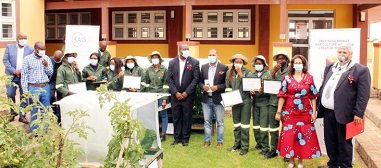
AU Commissioner reveals Africa’s first food-loss prevention strategy at 73rd session of UN General Assembly

This week, Ambassador Josefa Sacko from Angola, the African Union Commissioner for Rural Economy and Agriculture, released“The Continental Post Harvest Loss Management Strategy” at the beginning of the 73rd session of the UN General Assembly in New York.
The strategy details a suite of innovations in policies, technology, market infrastructure, capacity building and investment needed to achieve a target for halving post-harvest losses in Africa by 2025. As the first-ever post-harvest loss strategy for the continent, it is a landmark for Africa and the Union’s 55 member states.
At the UN General Assembly in 2015, member states committed to Sustainable Development Goal Target 12.3 to halve food loss and waste by 2030. Three years later, a group promoting sustainable food production and utilisation, called Champions 12.3, is tracking the progress to reach this target. Their latest progress report shows that about two thirds of the world’s largest food companies have embraced the concept to reduce food waste on both the production and the consumption side.
“In a world where one in nine people go hungry, it is a tragedy that a third of all food is lost or wasted. Today’s Champions 12.3 report highlights that great progress has been made but we need more countries and companies to step up,” said Dave Lewis, Chair of Champions 12.3 and Group Chief Executive of Tesco.
According to an estimate by the UN’s Food and Agriculture Organisation, one-third of the world’s food is lost or wasted, totalling more than a billion tonnes annually. This equals almost US$1 trillion per year.
“For grains alone, the value of post-harvest losses in Africa are estimated to equal US$4 billion per year, an amount that could help feed 48 million people,” said Ambassador Sacko. “Tackling food loss is critical to Africa. Hence it is time for us to take action, and our new strategy is the foundation for that action.”
“The African Union’s new strategy clearly links reducing farm losses with reducing hunger. With joint efforts of private and public sectors in co-managed innovative partnerships we need to massively invest in zero food loss and also support farmers in building sustainable livelihoods, which can have ripple effects for generations to come,” said Hans Hoogeveen, Ambassador and Permanent Representative of the Netherlands to the UN Organizations for Food and Agriculture.
“In the coming years, the world needs to increase its financial investment in reducing the amount of food in Africa and Asia that is lost before hitting the market. At the other end of the food chain, governments and companies should focus on helping reduce consumer and household-level waste. If we can tackle both ends of the food chain, we stand a great chance of halving food loss and waste by 2030,” said Liz Goodwin, Senior Fellow and Director, Food Loss and Waste at the World Resources Institute.











































